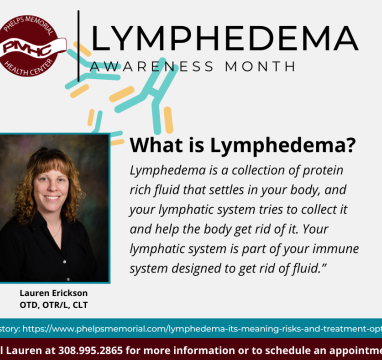Lymphedema Month is in March! To spread awareness, we talked to our very own, Lauren Erickson. As a Lymphedema Therapist, Lauren talks more about the condition and addresses the most frequently asked questions to be aware of. Consult with your doctor, or contact Lauren at Phelps Memorial Therapy Center with any questions you may have. 308.995.2865.
Q: What is Lymphedema?
A: The lymphatic system is designed to help the body get rid of cell debris, fat, cancer cells and other protein. It is a big part of your immune system. Lymphedema is when there are lymph nodes that have been affected and may not be functioning enough to help filter fluid. It can be caused by trauma, cancer treatment, surgery, poor cardiac system and venous insufficiency to name a few causes.
Q: How can I tell if I have Lymphedema?
A: A lot of times it will be that feeling of edema/swelling first. I have patients that will say “My leg/arm/trunk feels achy.” A lot of it depends on medical history. I ask about surgeries, cardiac history, cancer history, or other areas that may cause lymphedema.
Q: Am I at Risk of Getting Lymphedema Following My Breast Cancer Treatment?
A: Any type of cancer treatment can cause lymphedema. Anytime the lymph nodes have been removed or affected, it can cause lymphedema. We do quite a bit of educating patients before, during, and after treatment about lymphedema. If someone has a history of cellulitis, they are more prone to get lymphedema.
Q: Will Exercise Help with Fighting Lymphedema?
A: Yes. We tailor exercise programs to the patient’s needs. The theory is “start low, go slow.” We check range of motion and strength. We also follow if there are any precautions from medical staff. We take circumferential measurements to assess swelling/edema.
Q: What is a Recommended Treatment for Lymphedema?
A: Depends on the stage. A lot of times we start out with manual lymph drainage (MLD). We find a lymph nodes that are affected. We either do it here in the clinic where I show them or I give them a handout to show them how to do it themselves. If it’s really scarred down, sometimes we’ll do the MLD before and then we do compression bandaging. We can actually wrap limbs and they wrap for 24-48 hours and that muscle movement will help the lymphatic system push the fluid out. A lot of times people don’t like to get bandaged because it is really restrictive and then it’s hard to shower and do daily tasks, so I don’t bandage everyone, but the gold standard treatment would be MLD, bandaging, and fitting somebody for a garment. Even though you can get the swelling down to a certain point, you’re not going to get rid of it completely since it’s a chronic condition. If they keep it compressed, it’s going to help contain it. If they go and do a bunch of exercises without something on, it’s really taxing on your Lymphatic System and then they can have a rebound effect. Usually I see a people a couple times a week for 4-6 weeks to make sure we’re on the right track.
Consult with your doctor or contact Lauren at Phelps Memorial Therapy Center if you have any questions. 308.995.2865.



